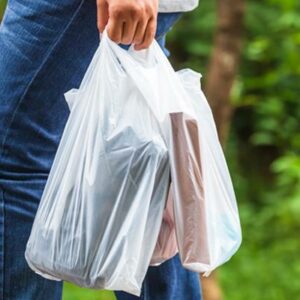When New Jersey Gov. Phil Murphy signed the 2020 bill banning single-use plastic and paper bags in his state, he called it “historic.”
“We are addressing the problem of plastic pollution head-on with solutions that will help mitigate climate change and strengthen our environment for future generations,” Murphy said.
Just three years into that future, science and data have some people rethinking their support.
Since the regulation was enacted in May 2022, researchers at Monmouth University found support has fallen from 61 percent to 56 percent. It was as high as 65 percent before Murphy signed the ban into law.
Zachary Taylor of the American Recyclable Plastic Bag Alliance says it was unsurprising why support is falling.
“People are seeing with their own eyes that this may not be as sustainable as the proponents of this policy had hoped,” says Taylor.
The long-made claim against single-use plastic bags as “one of the most problematic forms of garbage” and millions of them are ending up in landfills, rivers, and oceans. Other critics say the bags cannot be recycled. As a result, proponents would rather people use stitched-handle bags instead of single-use plastic bags. Still, Taylor said many people have racked up several, if not dozens, of these stitched-handle bags.
“Most consumers are realizing that not only are these bags far more expensive for them and their families, but they are also made out of plastic, they’re far thicker, and they cannot be recycled,” says Taylor.
A 2017 report from Stanford University said, “An average cotton shopping bag would need to be reused 131 times to account for its higher impact on the production side.”
And the New Jersey law went beyond plastic bags. It also ordered restaurants to stop offering plastic straws. Instead, customers must ask for them.
“This comprehensive plastic ban not only bans plastic bags, but also polystyrene and the offering of plastic straws. This is a critical step forward when it comes to protecting our environment from plastics,” Jeff Tittel, director of the New Jersey Sierra Club, said when the bill was signed.
But a new study released last month found some of the paper products being used to replace single-use plastic straws contain dangerous PFAS chemicals, sometimes referred to as “forever chemicals.”
At least eight other states have passed bans on so-called “single-use” plastic bags, but New Jersey’s ban is considered the strictest in the nation. Unlike other places where retailers charge a small fee for customers who request a plastic bag, patrons in New Jersey do not have that option. Busines.NJ.Gov specifically states that “New Jersey retail stores, grocery stores, and food service businesses may not provide or sell single-use plastic carryout bags.”
Taylor noted that stitched-handle bags being pushed to replace plastic bags are largely imported from businesses based in some of the world’s worst polluting countries. Single-use plastic bags are made in America by companies employing thousands of people, including in Pennsylvania.
“America’s plastic bag manufacturers are also plastic bag recyclers,” says Taylor. “When you look at the life cycle analyses that have been done comparing the overall environmental impacts of these stitched-handle bags to the single-use plastic bag, single-use plastic retail bag is the one with the fewest environmental impacts.”
In Pennsylvania, a 2019 moratorium on plastic bag bans ended in 2021. Several Delaware Valley communities have imposed bans on consumers and businesses. Philadelphia, West Chester, Haverford, Narberth, Easttown, Tredyffrin, and Radnor all have plastic bag bans.

